GSAS Students Discover New Possibilities Through Internships
September 24, 2024
Abigail Arnold | Graduate School of Arts and Sciences
Throughout the year, the students at Brandeis University’s Graduate School of Arts and Sciences (GSAS) learn a lot in the classroom, the archives, or the lab. But there’s also very important learning that takes place elsewhere – and students gain that kind of learning through internships, where they discover new ways to apply their existing knowledge and skills and connect what they’re doing on campus to a range of career opportunities. Often with support from the GSAS Professional Development team, students find internships on and off campus, in fields from biotechnology to museums. Six GSAS students and recent alums shared their experiences with internships in the past year, what they learned, and what advice they would give other students.
Rachel Dale, fifth-year PhD student in English, Brandeis University Archives and Special Collections
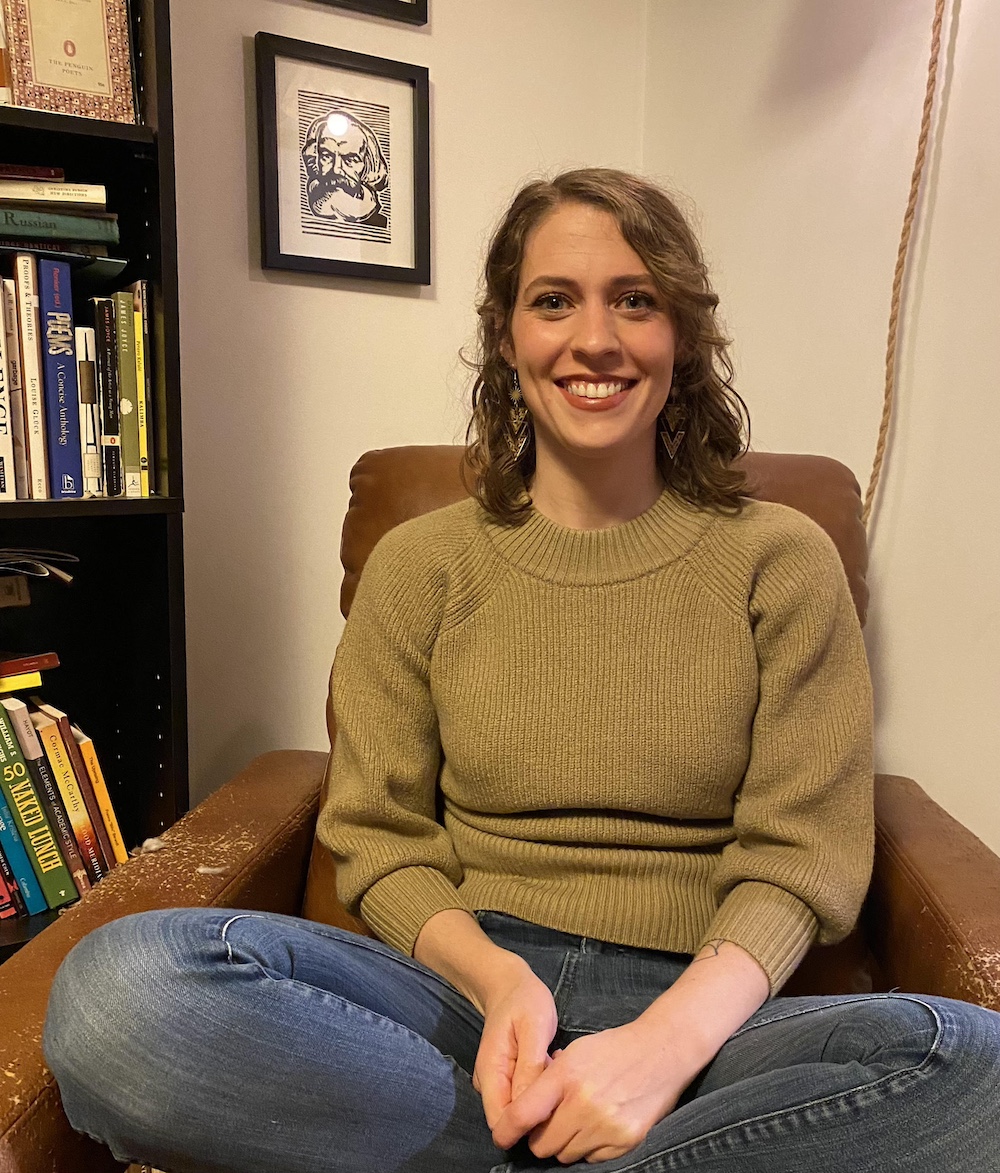 When Rachel Dale needed to do an internship as part of the requirements for her fourth year in the English PhD program, she knew she wanted hands-on experience in a library. After talking to various local libraries, she connected with the Brandeis University Archives and Special Collections and joined them as an intern to work on a range of projects. These included processing materials transferred from the Classical and Early Mediterranean Studies Department by identifying items, as well reviewing the collection of all student newspapers to make sure it included all issues and that they were in good preservation order. While she began the internship in the fall of 2023, it worked out so well that she has continued working with the department and taking on new projects and responsibilities; this summer, she worked on coordinating the multilingual pamphlets in the library’s Spanish Civil War collection to make sure they aligned with the cataloged list. “The library staff is amazing,” she said. “I really love getting to handle the materials as well. There’s something very cool about being close to history, whether it’s in Dutch or English.”
When Rachel Dale needed to do an internship as part of the requirements for her fourth year in the English PhD program, she knew she wanted hands-on experience in a library. After talking to various local libraries, she connected with the Brandeis University Archives and Special Collections and joined them as an intern to work on a range of projects. These included processing materials transferred from the Classical and Early Mediterranean Studies Department by identifying items, as well reviewing the collection of all student newspapers to make sure it included all issues and that they were in good preservation order. While she began the internship in the fall of 2023, it worked out so well that she has continued working with the department and taking on new projects and responsibilities; this summer, she worked on coordinating the multilingual pamphlets in the library’s Spanish Civil War collection to make sure they aligned with the cataloged list. “The library staff is amazing,” she said. “I really love getting to handle the materials as well. There’s something very cool about being close to history, whether it’s in Dutch or English.”
Dale found that she both used her existing research skills and learned a lot of new ones as an intern. “Being able to navigate an archive cataloging system is very important for my own research,” she said. “I used that part of my brain when first thinking about which items had research value: this is something I could see someone else picking up so I want to preserve it. I also have to take detailed notes – any time I move or update something, I have to write that down. It’s very much like the editing process when writing a scholarly article, when you make note of what you’re changing. The process of working in archives is similar to what we do in the humanities, since we have to interpret a system someone else used – it’s almost like close reading someone else’s files.” Furthermore, Dale learned more about the value of archives and picked up techniques she plans to use elsewhere. “I think it’s really easy to underappreciate an archive when you’re a researcher who’s just using it for one item, but the work scholars do would not be possible without the archive,” she said. “I’ve also developed a bit more of a system of organizing and time management. When I look back at some of my lesson plans, I think they’re messy – if I was another person looking at them in an archive, I wouldn’t know what they mean! So I’ve been thinking more about translating my thoughts to be legible for posterity.”
Dale saw ways in which her experience in the archives could shape her scholarly research. “When I hopefully turn my research into a larger project, maybe that will turn into an archive,” she said. “This is something that I want to integrate into the scholarly work that I do – to be able to curate an archive that others might find useful.” For internship tips, Dale stressed the importance of networking. “What I found to be really productive was talking to many different people in the field,” she said. “I did a lot of informational interviews with people working at university libraries across the country. That was really helpful in knowing what I would need to do to make connections.”
Sydney Lenhart, second-year Bachelor’s/Master’s student in Biotechnology, Yurogen
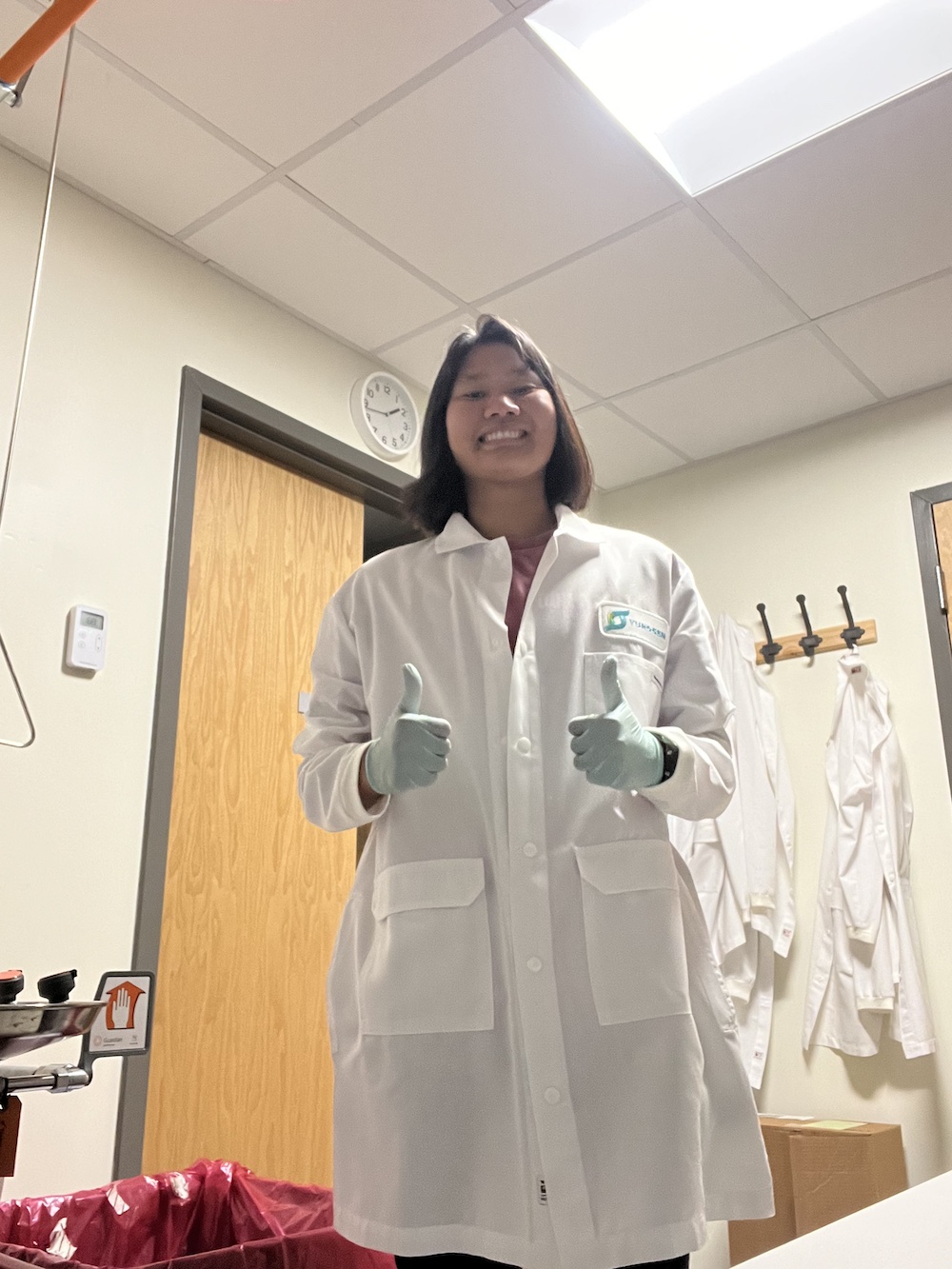 Sydney Lenhart, a bachelor’s/master’s student in Biotechnology, spent the summer as an intern at Yurogen Biosystems. She worked in a lab group that focused on detecting antibodies. “I was also able to talk to different groups since it was a very small company: under thirty people in the building,” she said. “It was cool to experience a smaller biotech company and understand their culture more; since this was my second time doing an internship in industry, I was able to compare.” Lenhart especially appreciated the company’s nurturing atmosphere. “Every month, the company has a group lunch,” she said. “I loved getting to know everyone and learning how they got where they are. They really prioritized us learning – my mentor, Dr. Han, was very big on making sure we dug deeper into knowledge, not just following the protocol but someday being able to make our own.”
Sydney Lenhart, a bachelor’s/master’s student in Biotechnology, spent the summer as an intern at Yurogen Biosystems. She worked in a lab group that focused on detecting antibodies. “I was also able to talk to different groups since it was a very small company: under thirty people in the building,” she said. “It was cool to experience a smaller biotech company and understand their culture more; since this was my second time doing an internship in industry, I was able to compare.” Lenhart especially appreciated the company’s nurturing atmosphere. “Every month, the company has a group lunch,” she said. “I loved getting to know everyone and learning how they got where they are. They really prioritized us learning – my mentor, Dr. Han, was very big on making sure we dug deeper into knowledge, not just following the protocol but someday being able to make our own.”
Lenhart found the internship when Dr. Neil Simister, the director of the Biotechnology program, connected her with an alum who worked at Yurogen; Lenhart and the alum communicated via email, and the alum invited her to send her resume along to apply for an internship. She found that her communication skills, honed by giving presentations throughout her time in the program, came in handy during her interview, when she was able to present herself and tell the interviewers what she’d learned so far. Once there, she was able to use her laboratory skills. “ A lot of my lab skills came into play at the internship, and I was able to understand the process because of what I’ve learned from professors within the program,” she said. “I was used to working in a small group setting, so that translated well and I wasn’t afraid to ask questions.”
Lenhart hopes to go into industry after graduation and is especially happy to be located in an area with such a strong biotech industry, which has provided her with opportunities to dip her toes in via internships. She shared advice for other students: “Find an internship earlier rather than later, especially in a field where a lot of people are looking. Once you have an internship, be curious, try to learn as much as you can, be engaged, and don’t have distractions with you. Don’t sit around, but make the most of the opportunity you have. Building relationships and getting to know people is key. You want to have a job that you wake up and want to go to! So putting yourself out there and being yourself is key.”
Teodora Markova, third-year PhD student in Neuroscience, Biogen
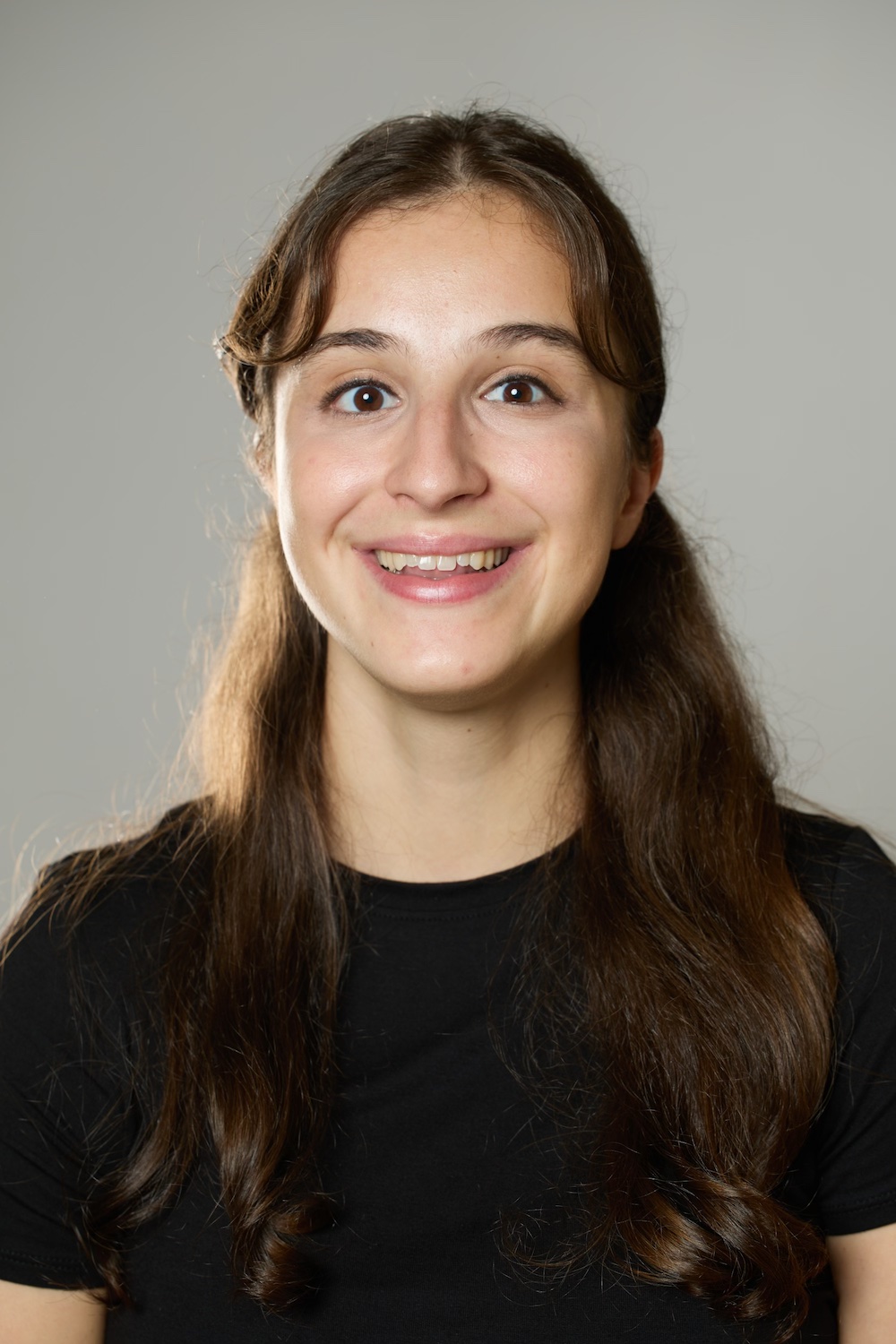 Neuroscience PhD student Teodora Markova is currently interning at Biogen; her co-op student role began in July and will continue through December. There, she works with the imaging biomarkers team to identify neuroimaging markers to track Alzheimer’s Disease progression and help assess how treatments are performing. Her work involves helping to develop more automated preprocessing pipelines and analyzing neuroimaging data from clinical trials, as well as meeting new people and learning how industry and clinical trials work. “I’ve really enjoyed talking with my colleagues, managers, and other co-ops because I’m learning about how companies like Biogen operate and about the opportunities after a PhD,” she said. “There are lots of roles I wasn’t even aware of! I also like taking part in something that could be helpful to real-world solutions, like assessing therapeutics and guiding trial-related decisions. It’s exciting to be a part of a team that can make real impacts on the lives of others.”
Neuroscience PhD student Teodora Markova is currently interning at Biogen; her co-op student role began in July and will continue through December. There, she works with the imaging biomarkers team to identify neuroimaging markers to track Alzheimer’s Disease progression and help assess how treatments are performing. Her work involves helping to develop more automated preprocessing pipelines and analyzing neuroimaging data from clinical trials, as well as meeting new people and learning how industry and clinical trials work. “I’ve really enjoyed talking with my colleagues, managers, and other co-ops because I’m learning about how companies like Biogen operate and about the opportunities after a PhD,” she said. “There are lots of roles I wasn’t even aware of! I also like taking part in something that could be helpful to real-world solutions, like assessing therapeutics and guiding trial-related decisions. It’s exciting to be a part of a team that can make real impacts on the lives of others.”
Markova was inspired to look for an internship through connecting with other students. “When I started the PhD, academia was the only option I was thinking about,” she said, “but as I’ve learned more about industry and learned from other Neuroscience students like Víkko [profiled below] who did internships, I went on LinkedIn and looked at opportunities for the future. I stumbled on this perfect fit and just went for it.” In the internship, Markova has been able to apply the skills from her PhD program to a new context. While the Berry Lab, in which she is a student, does a lot of neuroimaging, they look at healthy older adults. Her work at Biogen involves neuroimaging of Alzheimer’s patients. “I’m applying a lot of previous knowledge while learning new things and expanding the context,” she said. “I am building technical skills and collaborating with passionate people, and I am excited to apply these skills to my future work. I think I’ve also really grown in my ability to communicate science, including to people who have not just scientific but business backgrounds.”
Markova said the internship has helped her learn about new opportunities. “I went into this internship with the goal of testing whether I like being in industry and seeing what other people are doing. So far, this internship involves the parts of science that I personally really enjoy, so I’m hoping to find my way to a similar position in the future.” To other students, Markova said, “Keep an open mind throughout your PhD and really focus on what you are enjoying and what you would want to continue doing after. You might be surprised where your experiences take you, so always be on the lookout for opportunities to grow, talk to new people, and get some new perspectives. I found it helpful to talk to my colleagues and friends and have open discussions about these topics as we were going through the program together.”
Saffron Mintz Schuffman, MA’24 in Anthropology, Museum of Fine Arts Boston
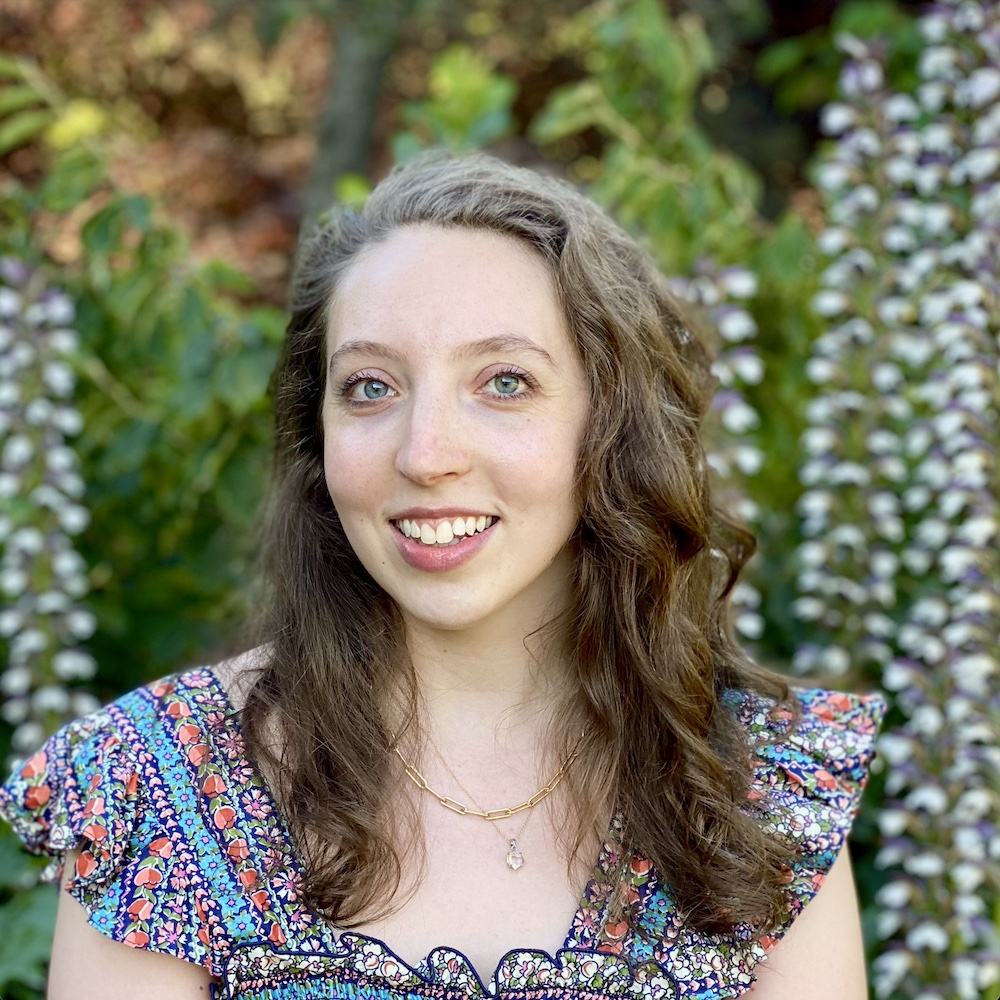 Saffron Mintz Schuffman, MA’24 in Anthropology, spent her final semester as the Graduate Provenance Research Intern at the Museum of Fine Arts Boston. There, she worked with the Senior Curator for Provenance, Victoria Reed, to track down the history of art pieces. She helped verify and validate provenance of many pieces, some of which hadn’t been checked for a while, and was able to use her research skills to update the information and ensure it was accurate for other museum professionals, students, and those interested in the art. Mintz Schuffman’s own academic research focused on museums, which she said was an asset for the role. “My supervisor was glad I had a research background, which was something they were looking for. My research skills were definitely helpful,” she said. “And getting the opportunity to learn more about the behind the scenes aspects of museum work helped me understand more for my research–hopefully a mutual gain!”
Saffron Mintz Schuffman, MA’24 in Anthropology, spent her final semester as the Graduate Provenance Research Intern at the Museum of Fine Arts Boston. There, she worked with the Senior Curator for Provenance, Victoria Reed, to track down the history of art pieces. She helped verify and validate provenance of many pieces, some of which hadn’t been checked for a while, and was able to use her research skills to update the information and ensure it was accurate for other museum professionals, students, and those interested in the art. Mintz Schuffman’s own academic research focused on museums, which she said was an asset for the role. “My supervisor was glad I had a research background, which was something they were looking for. My research skills were definitely helpful,” she said. “And getting the opportunity to learn more about the behind the scenes aspects of museum work helped me understand more for my research–hopefully a mutual gain!”
Mintz Schuffman initially talked with Jon Anjaria, the GSAS Faculty Director of Professional Development, about wanting to work in museums. He pointed her to a Zoom information session about museum internships, which she attended, following that up with the Museum of Fine Arts’ own in-person information session. She was very excited to have the opportunity to work more in the museum field. “I had some experience in galleries and collections management at Brandeis, but I had never had experience in a large-scale museum. Getting to learn more about what that looks like helped me feel more confident going into the field,” she said. “I also learned more about the kind of environment I want to work in; for example, I realized I’m very interested in working in a larger-scale museum. I’m now more confident and excited about entering this professional field!” Furthermore, she gained a lot from interaction with her colleagues. “The people I worked with were incredible,” she said. “I felt very valued and respected. I had a seat at the table and a voice in conversations. I appreciated that my research was making a visible impact and being published on the MFA website. Other researchers could go look at it and use it.”
When asked what she would tell other students about internships, Mintz Schuffman said, “Do it! Make sure you’re able to have a good work/life/education balance. Find a place that feels like a good fit for you; don’t just do an internship to do one, but find a place that has a position you’re excited about and people who will value you being there.” Finally, she said, “It was a great experience for me. I learned so much, and it helped me feel more sure about the career path I’m on.”
Víkko Suárez Casanova, sixth-year PhD student in Neuroscience, Eli Lilly
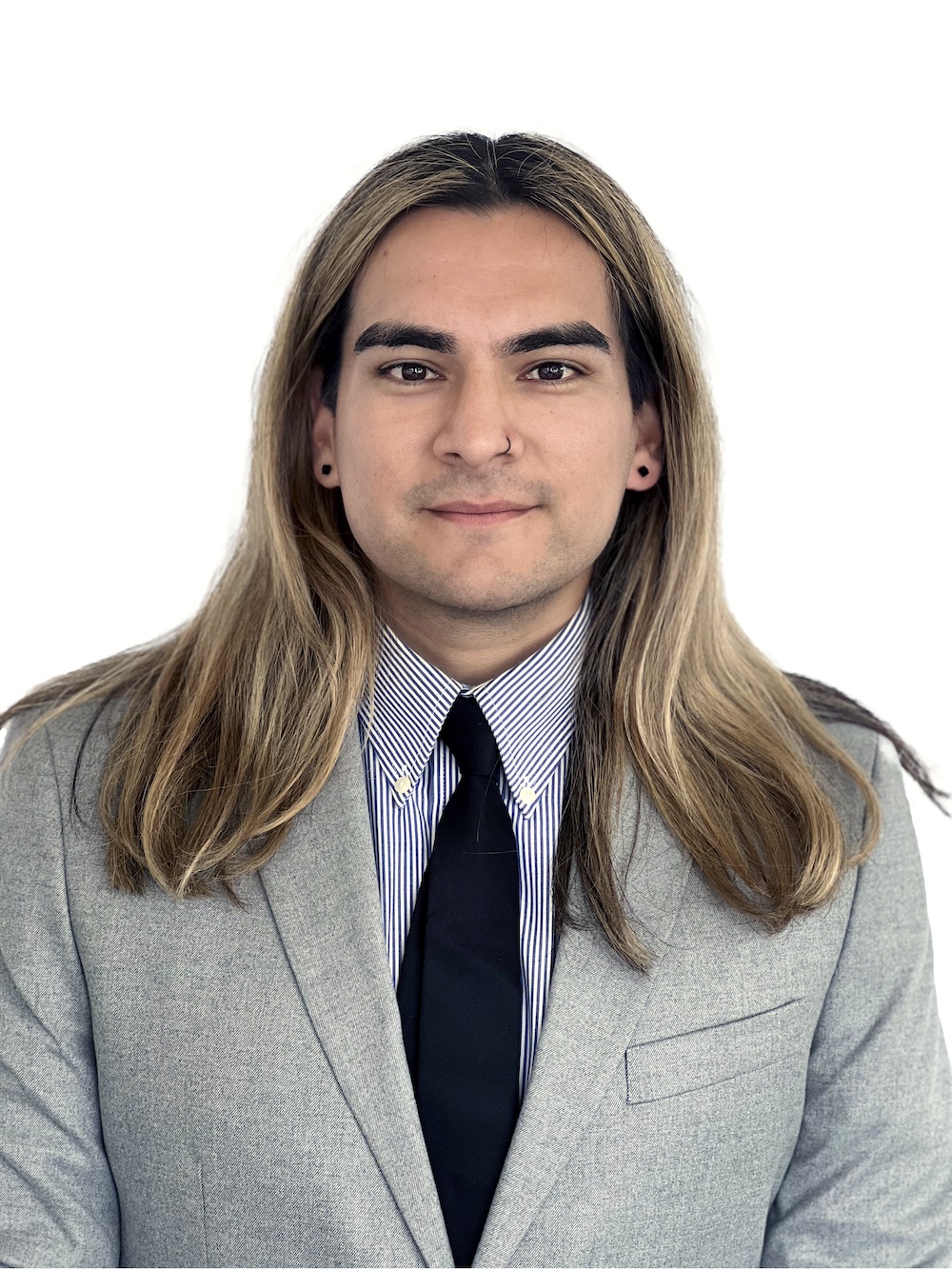 Víkko Suárez Casanova, who is approaching the end of his PhD in Neuroscience, interned as a research and development scientist in the Lilly Institutes of Genetic Medicine (LIGM) at Eli Lilly & Company in the spring of 2024. He worked in the chemical biology group, where he worked in the preclinical space on an early research and development project, spending his time balancing being in the laboratory, attending meetings, and adjusting to the pace of a pharmaceutical company. “There was a lot of overlap with what I’ve been doing in the program,” he said. “I joined a project that was not my area of expertise, but had overlapping technical experience. This allowed me to assess my learning agility and adaptability. I leveraged both my technical and soft skills from my PhD and collaborate across departments. Even though I was in LIGM, I worked closely with teams in Chemistry and Pharmacology. My program's focus on developing our scientific communication through our seminar presentations prepared me well for my project presentation to multiple departments. My program’s journal clubs and pizza talks prepared me a lot for the presentation I had to give at the end of the internship.” He also learned a lot from his colleagues: “Everyone there was so open, willing to schedule one-on-one coffee talks to talk about anything and provide feedback,” he said.
Víkko Suárez Casanova, who is approaching the end of his PhD in Neuroscience, interned as a research and development scientist in the Lilly Institutes of Genetic Medicine (LIGM) at Eli Lilly & Company in the spring of 2024. He worked in the chemical biology group, where he worked in the preclinical space on an early research and development project, spending his time balancing being in the laboratory, attending meetings, and adjusting to the pace of a pharmaceutical company. “There was a lot of overlap with what I’ve been doing in the program,” he said. “I joined a project that was not my area of expertise, but had overlapping technical experience. This allowed me to assess my learning agility and adaptability. I leveraged both my technical and soft skills from my PhD and collaborate across departments. Even though I was in LIGM, I worked closely with teams in Chemistry and Pharmacology. My program's focus on developing our scientific communication through our seminar presentations prepared me well for my project presentation to multiple departments. My program’s journal clubs and pizza talks prepared me a lot for the presentation I had to give at the end of the internship.” He also learned a lot from his colleagues: “Everyone there was so open, willing to schedule one-on-one coffee talks to talk about anything and provide feedback,” he said.
Suárez Casanova worked with Marika McCann, the GSAS Associate Director of Professional Development and Employer Outreach, on all steps of the application process for the internship, which he learned about when attending the Bio International Conference in Boston. There, he met people from Lilly who encouraged him to apply. “I’m a big believer in making informed decisions, so I wanted to see what an industry lab was like,” he said. “It was extremely important that I had two very different internships. My internship at Brandeis’s patent office last year let me see what a PhD can be used for outside of the lab, and working in the lab at Lilly showed me that a lot of the things we do every day, like reading papers and presenting, are very translatable skills. I found I like reading and being on top of the literature but not being physically in the lab as much.”
Following the internship, Suárez Casanova received job offers from Lilly and from law firms, ultimately accepting a role with a law firm, Choate, Hall & Stuart. They credited their internship experiences with helping them figure out what to apply for and pursue. They closed their discussion with three “Víkko-isms” of advice: “Closed mouths don’t get fed: be open when you’re looking for an opportunity. You don’t know until you do it: if you’re considering industry, you should do an internship to build your network and see if you’ll like a role. Stay ready: you don’t have to get ready if you stay ready, so have your elevator pitch, a clean resume, and LinkedIn ready to go. They looked me up on LinkedIn before every meeting at Lilly, and that’s your public face. LinkedIn should be like a job!”
Zhaoxi Zheng, PhD’24 in Chemistry, Indium Corporation
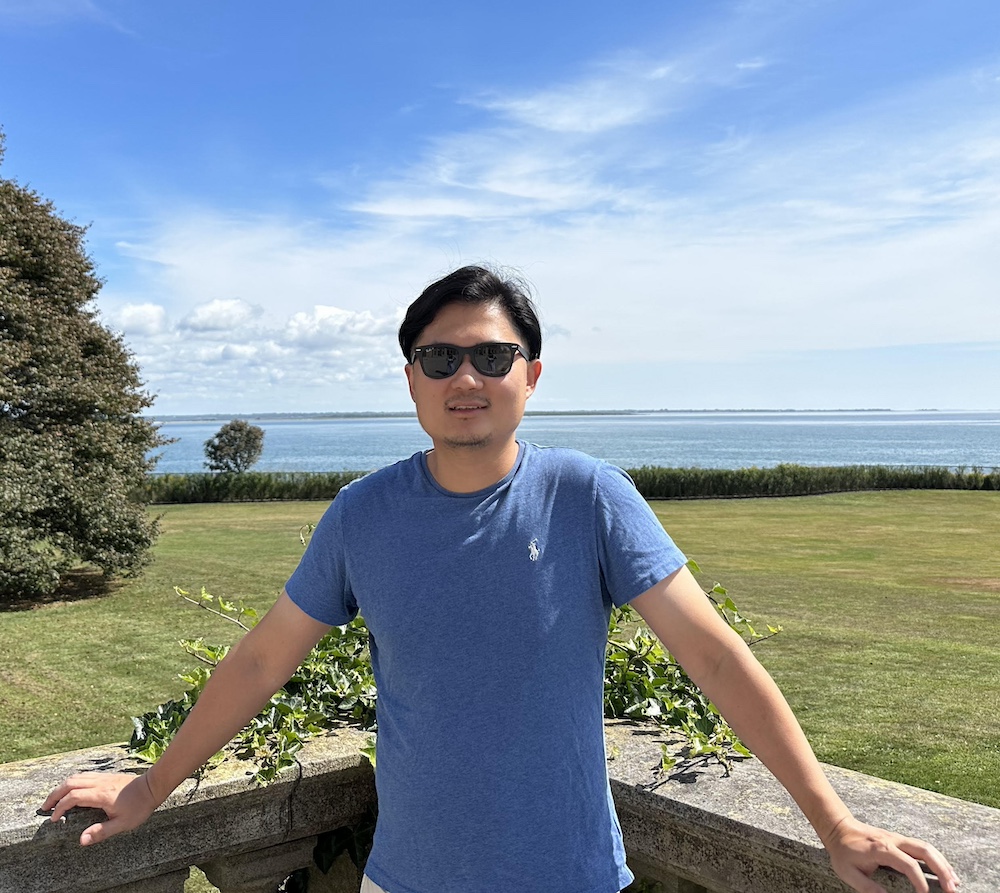 Zhaoxi Zheng, who graduated with his PhD in Chemistry in August of 2024, interned with Indium Corporation in the fall of 2023. The company creates innovative thermal interface materials for electronics, and Zheng worked on a project to develop nanofabrics that could transfer heat efficiently. “We tried many different things and all kinds of tests of nanofabrics,” he said. “I was there only three months, but I was still able to make some prototypes and start to show that the direction was correct. It was quite meaningful to be involved in developing a new project from scratch. The team was very supportive, and I learned a lot about how industry tackles things and solves problems.”
Zhaoxi Zheng, who graduated with his PhD in Chemistry in August of 2024, interned with Indium Corporation in the fall of 2023. The company creates innovative thermal interface materials for electronics, and Zheng worked on a project to develop nanofabrics that could transfer heat efficiently. “We tried many different things and all kinds of tests of nanofabrics,” he said. “I was there only three months, but I was still able to make some prototypes and start to show that the direction was correct. It was quite meaningful to be involved in developing a new project from scratch. The team was very supportive, and I learned a lot about how industry tackles things and solves problems.”
Zheng, who found his internship through LinkedIn, found that mindset was especially important to internship success. “I didn’t use much of my existing expertise because I typically use different techniques, but the mindset I learned in the PhD can be transferred to other techniques – what’s important is how I approach a problem,” he said. “Technical skills can always be trained. The mindset of doing science or research needs to be learned over time in the PhD and the lab.” Working in industry also helped him learn new norms. “In an industry environment, you are forced to learn new things by yourself,” he said. “There’s mentorship, but your manager can’t always be watching you, so you need to work by yourself and solve problems. Especially when hiring a PhD student, they want someone who has good problem-solving and communication skills across the team. I communicated with my boss almost every day about how the project was going and what we should do next. Teamwork and communication are always the most important things in industry.”
The internship experience also helped Zheng consider new possibilities for his future. “It made me realize that I do not want to limit myself to only the techniques I use now,” he said. “I realized that I have a lot of possibilities out there, and, with this experience, I proved to myself that I can do different things, that I am a quick learner, and that I can adapt to new environments.” When offering his advice, Zheng said, “If you really want to pursue an industry career, I highly recommend an internship or co-op when you have the chance. Don’t be afraid of making mistakes – before you come, you know nothing, so it’s common to make mistakes at first. Your expertise might be valuable, but it’s most important you’re a team player and that you communicate well about the work. You will learn a lot about workplace dynamics that you can’t learn in a PhD program.”






